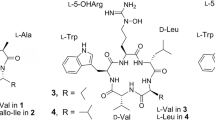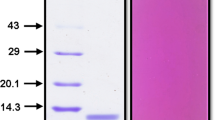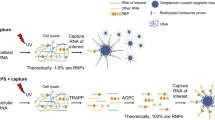Abstract
SIRENIN (I am indebted to Dr. A. Vegis for suggesting, what seems to me, this aptly descriptive name) is the name, used here for the first time, for the chemotactic sexual hormone from the water-mould Allomyces which attracts the male gametes and is produced by the female gametes1. This hormone has now been produced and purified.
This is a preview of subscription content, access via your institution
Access options
Subscribe to this journal
Receive 51 print issues and online access
$199.00 per year
only $3.90 per issue
Buy this article
- Purchase on Springer Link
- Instant access to full article PDF
Prices may be subject to local taxes which are calculated during checkout
Similar content being viewed by others
References
Machlis, L., Physiol. Plantarum, 11, 181 (1958).
Emerson, R., Lloydia, 4, 77 (1941).
Marinette, G. V., Erbland, J., and Kochen, J., Fed. Proc., 16, 837 (1957).
Kirsten, W., Anal. Chem., 26, 1097 (1954); Chemie analytique (in the press).
Author information
Authors and Affiliations
Rights and permissions
About this article
Cite this article
MACHLIS, L. A Procedure for the Purification of Sirenin. Nature 181, 1790–1791 (1958). https://doi.org/10.1038/1811790b0
Issue Date:
DOI: https://doi.org/10.1038/1811790b0
This article is cited by
-
Chemotaxis and transport of amino acids in Allomyces arbuscula
Antonie van Leeuwenhoek (1976)
Comments
By submitting a comment you agree to abide by our Terms and Community Guidelines. If you find something abusive or that does not comply with our terms or guidelines please flag it as inappropriate.



